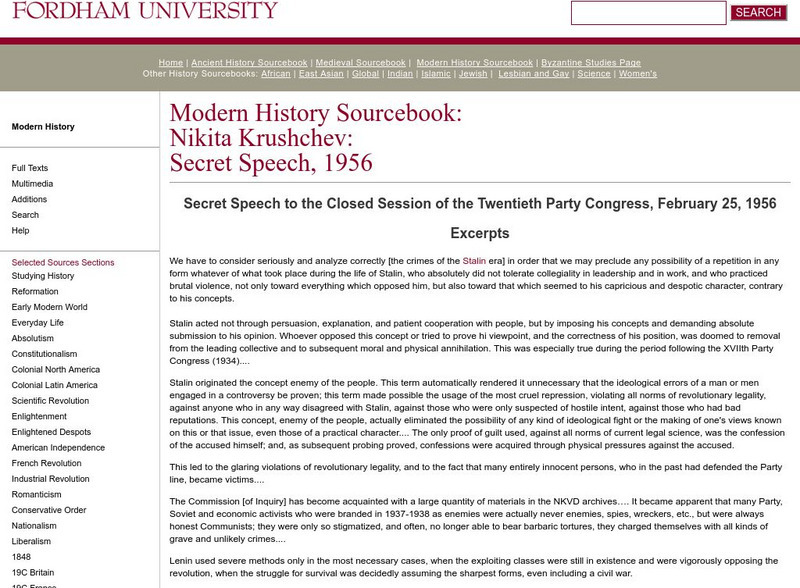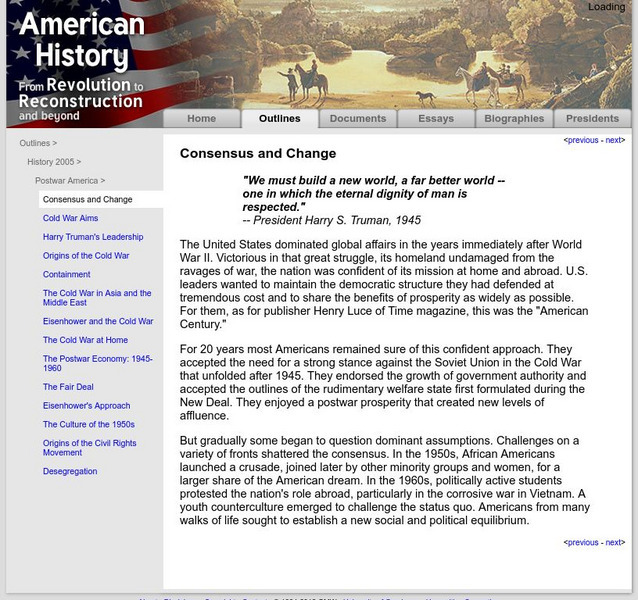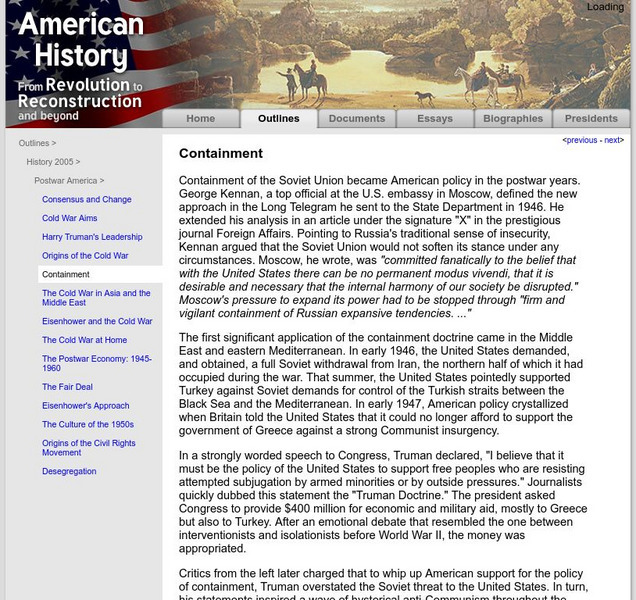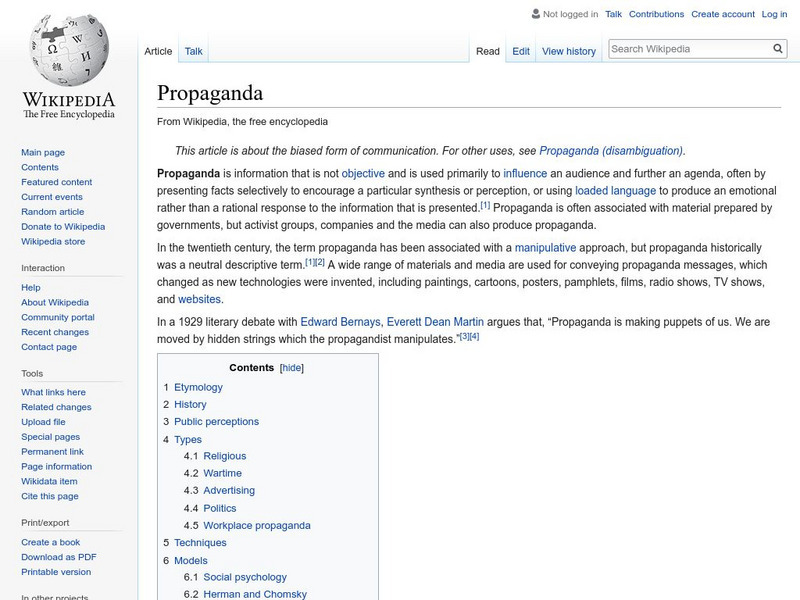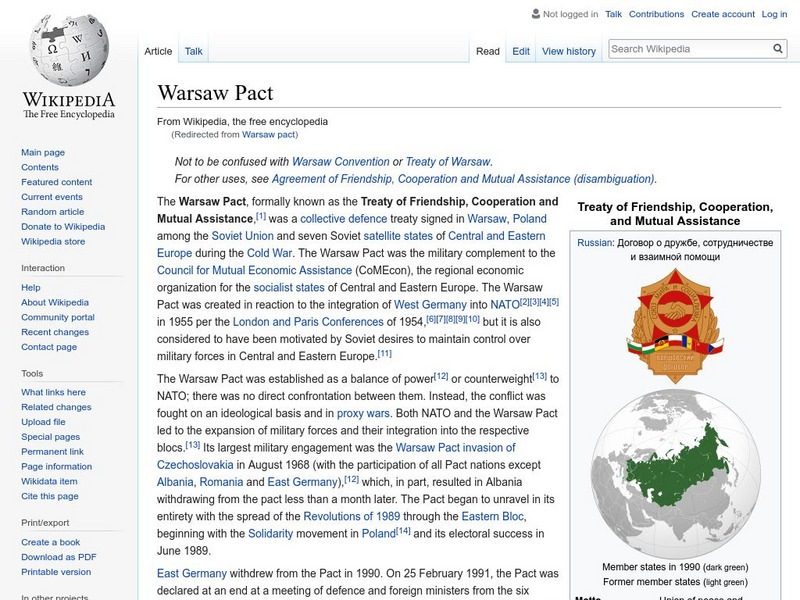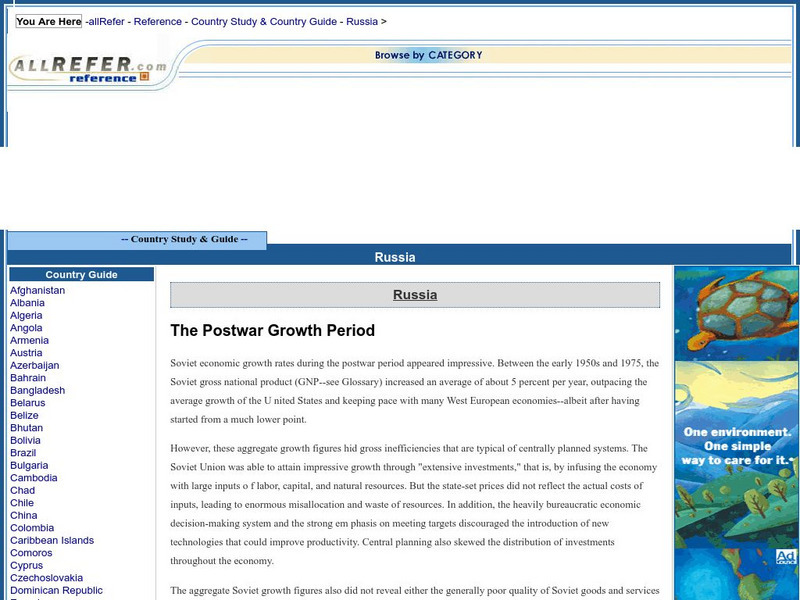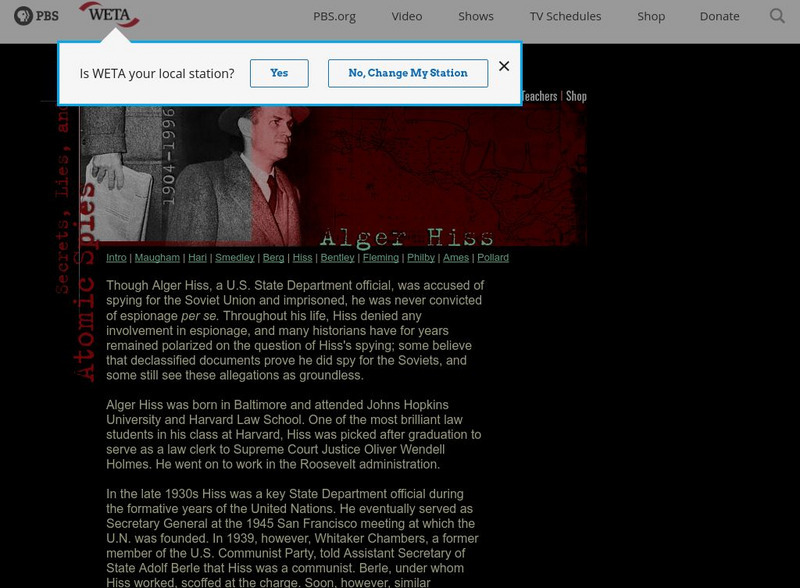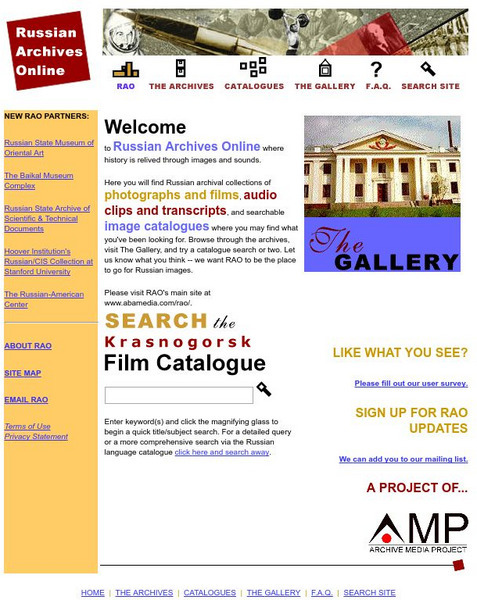Internet History Sourcebooks Project
Fordham University: Modern History Sourcebook: Khrushchev's Secret Speech
This site provides some excerpts from a translation of Khrushchev's famous Secret Speech denouncing Stalin policies.
University of Groningen
American History: Outlines: Consensus and Change
Brief illustration of the changes in U.S. domestic and foreign policy that occurred following WWII.
University of Groningen
American History: Outlines: Containment
Article outlines the U.S. policy to keep the spread of communism at bay and the Soviets in check.
White Pine Pictures
White Pine Pictures: Hungarian Revolution 1956
As part of the film series produced about various groups that resettled in Canada, White Pines Pictures gives a brief historical background of the wave of Hungarian immigration in 1956. Click on the teacher link at the top for lesson...
US National Archives
Nara: Teaching With Documents: The United States Enters the Korean Conflict
This is a lesson plan outline which correlates the relationship between NSC-68 and U.S. policy in Korea. A National Archives and Records Administration site (NARA) with additional links to more teaching resources.
University of Pennsylvania
University of Pennsylvania: The Truman Doctrine
This site from the University of Pennsylvania gives a description of the Truman Doctrine and its contents. Then link to an excerpt from Howard Zinn's "A People's History of the United States" and compare the differences. A great history...
Wikimedia
Wikipedia: Mid Canada Line
A concise description of the Mid-Canada Line of radar stations. Covers history of this early-warning system that was in place in the 1950s and 1960s, a list of the locations and a list of the POL Supply Points that provided fuel to the...
InterKnowledge Corp.
The Soviet Era
Geographia presents a brief political and social history of Russia from the beginning of Soviet rule to the resignation of Gorbachev in 1990.
The History Place
The History Place: Jfk Cuban Missile Crisis
This site from The History Place has the text of President John F. Kennedy's speech addressing the nation about the Cuban Missile Crisis. An audio clip of the speech is also included.
Michigan State University
Michigan State University: Domino Theory Principle, Dwight D. Eisenhower, 1954
President Eisenhower's news conference of April 7, 1954, with questions and answers. Includes the complete interview.
PBS
Pbs: American Experience: George F. Kennan
PBS profiles the life of American diplomat George F. Kennan, whose ideas about the expansionist ambitions of the Soviet Union shaped the U.S. policy toward Communist countries known as containment.
Wikimedia
Wikipedia: Propaganda
A good overview and description of propaganda. Looks at types, techniques used, theories and models, and propaganda directed at children.
AllRefer
All refer.com: East Germany: Postwar Government
This site explains the economic and political developments of the German Democratic Republic (East Germany) after WWII. Contains information on dividing up Germany after WWII, the Soviet zone of occupation, Soviet interests and motives,...
Wikimedia
Wikipedia: Warsaw Pact
This encyclopedia article from Wikipedia gives information on the Warsaw Pact, which the Eastern Bloc was formed under. Provides a concise history and role of the agreement. Links are also given for additional information.
AllRefer
All refer.com: Pakistan: The United States Alliance
This article chronicles the relations between Pakistan and the United States after its independence from Great Britain. Agreements and foreign aid between the two countries are discussed, including the Mutual Defense Assistance Agreement...
AllRefer
All Refer Reference: Soviet Union: Economic Policy
A great overview of the economic policies implemented in the Soviet Union between 1917 and 1985. Describes collectivization, economic priorities, successes, and failures. Readers will come away with a sound understanding of Soviet...
AllRefer
All Refer Reference: Russia: Postwar Growth Period
This overview of Soviet economic policy after WWII looks at the command or planned economies and decisions of Stalin, Khrushchev, Brezhnev, and Gorbachev.
AllRefer
All Refer Reference: Soviet Union: The Khrushchev Era
This article surveys Soviet Union and its leader Nikita Khrushchev, who eventually wielded virtually supreme power after the death of Soviet dictator Joseph Stalin in 1953.
Smithsonian Institution
Smithsonian Education: Apollo 11 Walking on the Moon
Check out this interactive website about the space race.
PBS
Nova Online: Secrets, Lies, and Atomic Spies: Alger Hiss
Read about the case against Alger Hiss, who was accused of spying for the Soviet Union. Investigation was done by the House Un-American Activities Committee.
Stanford University
Stanford Report: Edward Teller, Father of Hydrogen Bomb
Students don't generally learn much about Edward Teller in school. But with the progress in science in the 20th century, maybe they should. Edward Teller was one of the main architects of the hydrogen bomb. This is a great site by...
PBS
Pbs: Red Files: Secret Soviet Moon Mission
PBS offers biographies and stories from the early days of the Soviet Space program, which prompted the Space Race and nuclear arms race between the U.S. and the former Soviet Union.
PBS
Russian Archives Online
The site explores Russian history through images, audio, and films. Offers links to Russian archival collections of photographs, movies, and audio clips.
Other popular searches
- The Cold War
- Cold War Political Cartoon
- Cold War Map
- Cold War Timeline
- Space Race Cold War
- End of Cold War
- Cold War Lesson Plans
- Origins of Cold War
- Events of the Cold War
- Cold War Leaders
- End Cold War
- Canadian History Cold War


